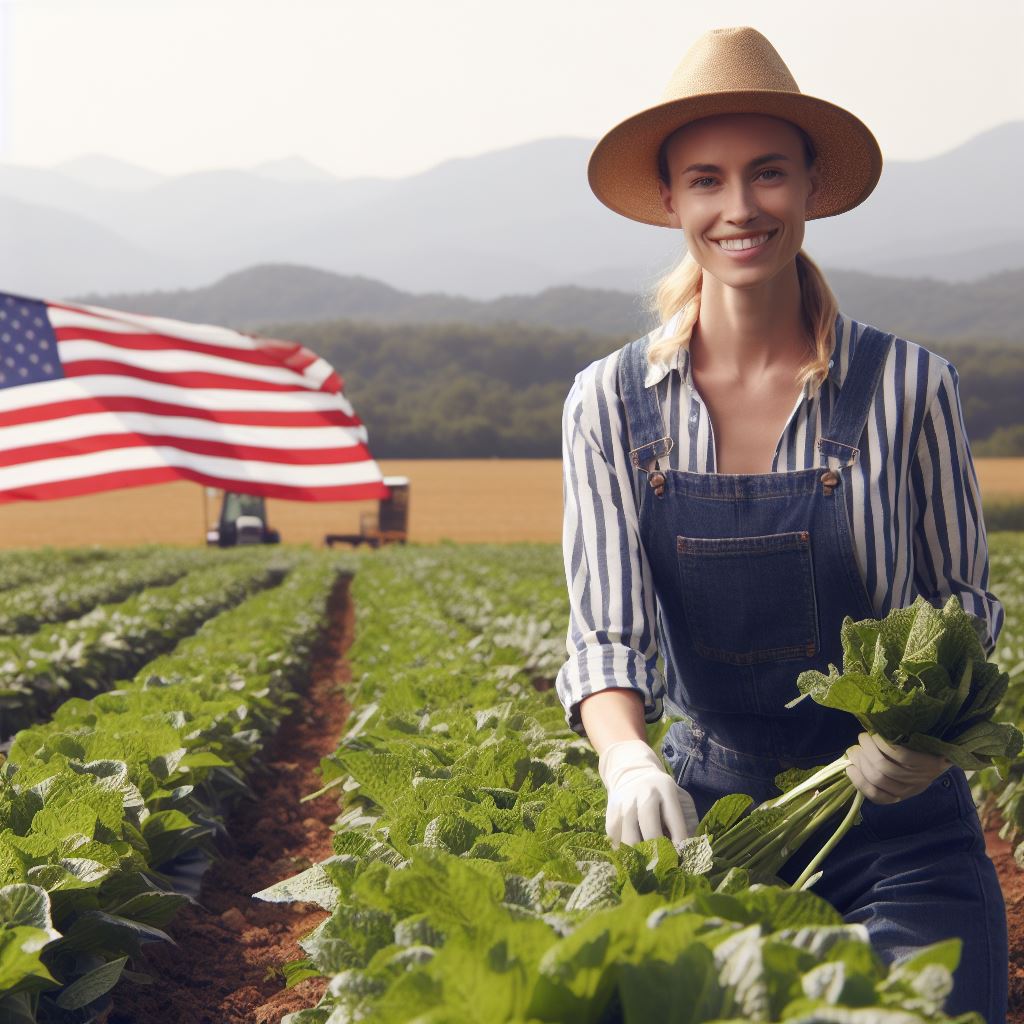Introduction
A. Importance of farmers in US community and culture
Farmers play a crucial role in the US community and culture, contributing to the overall well-being of the nation.
B. Overview of the role farmers play
They are responsible for providing the population with essential food and resources.
Additionally, farmers help preserve traditional practices and maintain the country’s agricultural heritage.
Their role goes beyond food production, as they also contribute to economic growth and job creation.
Through their work, farmers support local businesses and stimulate the agricultural sector.
Moreover, farmers play a vital role in environmental conservation by implementing sustainable farming practices.
They ensure the preservation of natural resources and biodiversity, promoting a healthier planet.
Farmers are deeply rooted in the community, hosting farmers’ markets and promoting local products.
This connection fosters a sense of unity and pride among community members.
They also participate in educational programs, sharing their knowledge and experience with future generations.
Basically, farmers are an integral part of US community and culture.
They provide sustenance, preserve traditions, stimulate the economy, and promote environmental sustainability.
Their unwavering commitment enhances the overall well-being and prosperity of the nation.
Historical Significance of Farmers in US Community and Culture
A. Early Settlement and Agriculture
Farmers played a pivotal role in the early settlement of the United States.
They were the backbone of the burgeoning colonies, taming wild lands, and cultivating crops to sustain their communities.
These early American farmers faced countless challenges as they toiled in the fields, but their efforts were essential for survival and growth.
They planted the seeds of American agriculture, and their dedication formed the foundation of the nation’s agrarian heritage.
B. Development of Farming Communities
As the United States expanded westward, farming communities sprouted across the land.
These tight-knit communities were the heart of American culture, fostering cooperation and mutual support. Farmers worked together, sharing their knowledge, tools, and resources.
Their collaborative spirit helped build the nation’s agricultural infrastructure, turning barren landscapes into fertile farmlands.
Transform Your Career Today
Unlock a personalized career strategy that drives real results. Get tailored advice and a roadmap designed just for you.
Start Now- Farmers built one-room schoolhouses to educate their children and ensure the community’s future.
- Barn raisings and harvest festivals celebrated unity and the fruits of their labor.
- Church gatherings in farming communities served as social and spiritual hubs, reinforcing shared values.
C. Farming Traditions and Practices Passed Down Through Generations
Generations of farmers have handed down their wisdom from parent to child, preserving time-honored traditions.
- Crop rotation methods and soil conservation techniques safeguarded the land’s productivity.
- Seed saving and selective breeding techniques led to resilient crops and hardy livestock.
- Storytelling around the kitchen table conveyed the trials and triumphs of farming life.
Today, the legacy of these early settlers and their descendants lives on in the fabric of American culture.
The dedication and resilience of farmers remain essential to our nation’s prosperity, reflecting the enduring connection between agriculture and community in the United States.
Whether cultivating crops in the heartland or tending livestock on family farms, farmers continue to shape the cultural landscape of this great nation, embodying the enduring spirit of the American farmer.
Economic Contribution of Farmers
A. Contribution to the US economy
Farmers play a significant role in contributing to the overall economy of the United States.
Through their agricultural activities, they contribute to the production of food and raw materials, which are essential for various sectors of the economy.
Farmers are responsible for cultivating crops and rearing livestock, which serve as inputs for several industries, including food processing, textile manufacturing, and biofuel production.
The agricultural sector contributes a substantial share to the Gross Domestic Product (GDP) of the country.
B. Job creation and employment opportunities
The farming sector is a major source of employment, providing opportunities to individuals across the United States.
Farming requires a diverse workforce, including skilled laborers, farm managers, agronomists, animal breeders, and equipment operators.
Furthermore, farmers often generate job opportunities indirectly through their collaboration with other sectors.
They rely on machinery manufacturers, seed and fertilizer suppliers, transportation services, and various support industries, all of which employ a significant number of people.
C. Impact on local businesses and industries
Farmers have a profound impact on local businesses and industries by creating demand for their products and services.
They contribute to the growth and viability of diverse sectors, such as equipment manufacturing, agricultural technology, and retail.
Local businesses flourish due to the purchasing power of farmers, who require equipment, tools, machinery, and other agricultural inputs.
This includes the purchase of seeds, fertilizers, pesticides, animal feed, and veterinary services, benefiting local suppliers and retailers.
Moreover, farmers often engage in direct marketing initiatives, such as farm stands, farmers’ markets, and Community Supported Agriculture (CSA) programs.
These activities stimulate local economies, attract tourists, and encourage sustainable consumption patterns.
D. Expansion of agricultural exports
Farmers also play a crucial role in expanding agricultural exports, boosting the US economy on a global scale.
They contribute to trade surpluses by producing high-quality food products and commodities that meet international standards.
The United States is recognized globally as a leading exporter of various agricultural products, including grains, meat, dairy, fruits, and vegetables.
Farmers’ efforts in maintaining high production levels and adhering to strict quality regulations enable them to capture international markets and generate revenue for the country.
E. Entrepreneurial opportunities and innovation
Farmers are often natural entrepreneurs and innovators.
They constantly seek solutions to improve their productivity, reduce costs, and minimize environmental impacts by adopting new technologies and techniques.
In recent years, agricultural innovation has flourished, with farmers embracing precision farming, genetically modified crops, and sustainable practices.
Such innovation not only benefits farmers but also fosters technological advancements that spill over into other industries, contributing to overall economic growth.
Generally, farmers play a crucial role in contributing to the US economy through their agricultural activities.
They generate employment opportunities, create demand for local businesses and industries, expand agricultural exports, and drive entrepreneurial opportunities and innovation.
The economic contribution of farmers goes beyond the boundaries of the agricultural sector and positively impacts various sectors of the economy.
Read: Innovative Projects Shaping US Agricultural Engineering
Food Production and Security
A. Farmers as providers of fresh and nutritious food
- Farmers play a crucial role in providing fresh and nutritious food to communities across the United States.
- Through their hard work and dedication, farmers grow a wide variety of crops and raise livestock, ensuring a diverse food supply.
- By cultivating fruits, vegetables, grains, and animal products, farmers contribute to the health and well-being of the population.
- Their efforts result in the availability of an abundance of nutritious options for consumers to choose from.
- The fruits and vegetables grown by farmers are rich in vitamins, minerals, and antioxidants that promote good health.
- Additionally, farmers ensure that their livestock is well-fed and cared for, providing high-quality meat, eggs, and dairy products.
- Their role as providers of fresh and nutritious food helps communities maintain a balanced diet and prevents food-related health issues.
B. Importance of locally grown and sustainable produce
- Locally grown produce holds great importance in community culture as it supports local farmers and businesses.
- When consumers choose locally grown food, they contribute to the economic development of their own communities.
- Buying locally reduces the carbon footprint associated with long-distance transportation of food.
- Locally grown food maintains its freshness since it does not have to travel long distances.
- Sustainable farming practices such as organic farming and crop rotation ensure minimal environmental impact.
- Farmers who embrace sustainability prioritize long-term soil health and biodiversity.
- By purchasing locally and sustainably grown food, communities promote a healthier environment and support sustainable farming practices.
C. Ensuring food security for the nation
- Food security refers to the availability and access to sufficient, safe, and nutritious food for all individuals.
- Farmers play a key role in ensuring food security at both the local and national levels.
- They work tirelessly to meet the growing demand for food and prevent shortages.
- By cultivating a variety of crops and diversifying food production, farmers reduce the risk of supply disruptions.
- The ability of farmers to adapt to changing conditions helps mitigate the impact of climate change on food production.
- Additionally, farmers contribute to food security by participating in government programs that support agricultural sustainability.
- Their commitment to sustainable farming methods helps protect the environment and ensure a stable food supply for future generations.
Essentially, farmers are essential for community and national food production and security.
Their role as providers of fresh and nutritious food supports healthy communities and prevents food-related health issues.
Locally grown and sustainable produce promotes economic development, reduces carbon footprint, and supports sustainable farming.
Furthermore, farmers contribute to food security by diversifying food production, adapting to changing conditions, and promoting sustainability.
Their dedication and hard work are vital in maintaining a stable and secure food supply for the nation.
Read: Sustainability Focus: How Ag Engineers Shape US Farms
Transform Your Career Today
Unlock a personalized career strategy that drives real results. Get tailored advice and a roadmap designed just for you.
Start NowEnvironmental Stewardship
In addition to their significant contributions to the economy and food production, farmers play a crucial role in environmental stewardship.
They implement conservation practices that help preserve and protect the natural resources of the United States.
By adopting sustainable farming methods, farmers ensure the long-term viability of agriculture while minimizing environmental impact.
This section explores the various ways in which farmers contribute to environmental stewardship through responsible agriculture.
A. Conservation practices implemented by farmers
- Farmers utilize cover crops to prevent soil erosion and improve soil health.
- They practice crop rotation to minimize pest and disease issues while enhancing soil fertility.
- Efficient irrigation systems are used to conserve water resources and reduce wastage.
- Conservation tillage techniques are employed to protect soil structure and enhance water infiltration.
- Farmers create wildlife habitats within their farms, promoting biodiversity and preserving natural ecosystems.
B. Sustainable farming methods
- Farmers employ organic farming techniques, minimizing the use of synthetic chemicals and promoting ecological balance.
- They implement integrated pest management strategies, using biological controls and crop rotation to control pests effectively.
- Precision agriculture is adopted, utilizing technology to optimize nutrient and pesticide applications, reducing waste.
- Transitioning to renewable energy sources such as solar panels and wind turbines helps reduce carbon emissions.
- Farmers prioritize soil conservation through practices like conservation plowing and contour farming.
C. Preservation of natural resources through responsible agriculture
- Farmers engage in land conservation by preserving farmland and preventing conversion to non-agricultural uses.
- Efficient use of fertilizers and manure management helps prevent nutrient runoff and protects water quality.
- Responsible waste management practices, such as composting and recycling, are implemented on farms.
- Proper management of livestock waste is crucial to prevent water contamination and protect aquatic ecosystems.
- Conserving water resources is a priority, with farmers utilizing innovative technologies like drip irrigation.
Farmers recognize the importance of their role as custodians of the environment and make conscious efforts to minimize their ecological footprint.
By adopting and implementing conservation practices, sustainable farming methods, and responsible agriculture, farmers contribute significantly to environmental stewardship.
Their actions help preserve natural resources, protect biodiversity, and ensure the sustainability of the agricultural sector for future generations.
Read: Overview of the Animal Breeder Career in the USA

Farmers as Guardians of Rural Communities
Farmers play a significant role in preserving rural traditions and heritage, ensuring the vitality of their communities.
With their deep knowledge and love for the land, they serve as guardians of the rural way of life.
A. The Role of Farmers in Preserving Rural Traditions and Heritage
One of the key roles of farmers in US communities is to uphold and pass down rural traditions and heritage from one generation to the next.
These traditions are an essential part of the cultural fabric of rural life, embodying the values, beliefs, and practices that have been shaped by the land for centuries.
For example, farmers engage in traditional farming methods that have been used in their communities for generations.
They cultivate certain crop varieties that have historical significance, ensuring that unique regional flavors and agricultural practices are preserved.
Furthermore, farmers often organize and participate in local events and festivals that celebrate rural traditions.
These gatherings provide opportunities for community members to come together and honor their shared heritage, fostering a sense of belonging and cultural identity.
B. Community Engagement and Support
Farmers play a crucial role in community engagement and support.
They not only produce the food and resources that sustain rural communities but also actively contribute to their social and economic development.
Farmers often collaborate with local businesses, schools, and organizations to create a thriving community.
They supply fresh produce to local markets, support farm-to-table initiatives, and participate in community-supported agriculture programs.
Moreover, farmers often serve as the backbone of local economies, employing community members and contributing to the tax base.
Their dedication to agriculture creates a ripple effect, boosting ancillary industries such as food processing, transportation, and hospitality.
C. Farmers as Leaders and Mentors
Farmers are not only farmers but also leaders and mentors within their communities.
Their wealth of knowledge and experience make them invaluable resources for aspiring farmers and the broader community.
They foster the next generation of farmers by mentoring young people interested in agricultural pursuits.
Through apprenticeship programs, internships, and educational initiatives, farmers pass on their skills, techniques, and wisdom to ensure the future of farming.
Beyond farming, farmers also lead community initiatives, advocating for agricultural policies and rural development.
They actively participate in local government, serving on boards and committees, providing insights and perspectives rooted in their deep understanding of the land and its potential.
To sum it up, farmers are the guardians of rural communities in the United States.
Through their dedication to preserving traditions, engaging with their communities, and serving as leaders and mentors, farmers ensure the resilience, vitality, and cultural richness of rural life.
Their role is indispensable in shaping and maintaining the unique identity of US rural communities.
Read: Key Qualifications for Top Animal Breeders in the US
See Related Content: Demand for Agricultural Engineers: A US Job Market Analysis
Cultural Impact of Farmers
A. Influence on American Cuisine and Culinary Traditions
Farmers play a pivotal role in shaping American cuisine, contributing to a rich culinary tapestry through their dedication to agriculture.
Their influence is evident in:
- Diverse Ingredients: Farmers cultivate a wide array of crops, ensuring a cornucopia of fresh, local produce, including fruits, vegetables, grains, and more.
- Seasonal Eating: The farming calendar impacts American eating habits, promoting seasonal, farm-fresh ingredients in dishes.
- Farm-to-Table Movement: The farm-to-table trend, championed by chefs and foodies, encourages the use of locally-sourced products, promoting sustainable agriculture.
- Fusion of Flavors: Farmers introduce unique flavors through heirloom varieties and specialty crops, inspiring creative culinary experimentation.
- Cultural Fusion: The melting pot of American culture blends flavors from different ethnic backgrounds, showcasing the farmer’s impact on diversity.
B. Farmer’s Markets and Farm-to-Table Movements
- Community Gathering Spaces: Farmer’s markets foster a sense of community, drawing people together to share in the joy of fresh produce and local products.
- Supporting Local Economy: By shopping at farmer’s markets, consumers directly support their local economy and the livelihoods of farmers.
- Healthy Eating: These markets promote healthier eating habits by providing access to nutritious, organic, and minimally processed foods.
- Environmental Benefits: Farm-to-table initiatives reduce the carbon footprint associated with food transportation, benefiting the environment.
- Educational Hub: Farmers’ markets offer a platform for farmers to share knowledge and consumers to learn about food sources.
C. Celebration of Agricultural Festivals and Events
- Harvest Festivals: Across the nation, farmers’ hard work is celebrated during vibrant harvest festivals, showcasing local produce and traditions.
- State Fairs: Iconic state fairs celebrate agriculture with livestock exhibitions, food contests, and thrilling rides.
- Farm Tours: Farms open their doors to the public, giving people an opportunity to connect with their food sources.
- National Agriculture Day: An annual event honors the contributions of American agriculture, recognizing its role in our daily lives.
- Food and Music Festivals: Many events combine food and music, showcasing farm-fresh dishes and local culinary traditions.
Farmers serve as the backbone of American culture and community, influencing our cuisine, providing fresh ingredients, and fostering a sense of togetherness.
Transform Your Career Today
Unlock a personalized career strategy that drives real results. Get tailored advice and a roadmap designed just for you.
Start NowTheir efforts are celebrated through a variety of festivals and events that bring the farm to our tables and hearts.
Challenges and Opportunities for Farmers Today
In recent years, farmers in the United States have faced numerous challenges due to climate change.
Rising temperatures, unpredictable weather patterns, and extreme events such as droughts and floods have greatly impacted agricultural practices.
These changes have forced farmers to adapt and find innovative solutions to protect their crops and livelihoods.
A. Climate change and its impact on farming
One of the major challenges that farmers face today is the impact of climate change on farming.
As temperatures continue to rise, it becomes increasingly difficult to grow certain crops in traditional farming regions.
For example, heat stress can reduce crop yields, while changes in precipitation patterns can lead to water scarcity or excessive flooding.
These climate-related challenges have forced farmers to explore new techniques and technologies to adapt their farming practices.
B. Addressing financial and technological obstacles
Another obstacle that farmers face is the need to address financial and technological obstacles.
Farming is a capital-intensive industry, requiring significant investments in land, equipment, seeds, and fertilizers.
However, many farmers struggle to access the necessary financial resources to invest in these inputs.
Additionally, keeping up with rapidly evolving technology can be a financial burden for small-scale farmers, limiting their ability to compete in the market.
C. Opportunities for innovation and diversification
Despite these challenges, there are also opportunities for farmers to innovate and diversify their operations.
Many farmers are now embracing sustainable and regenerative farming practices that help mitigate climate change while preserving the environment.
These practices include organic farming, crop rotation, and the use of cover crops.
By adopting these techniques, farmers can improve soil health, reduce chemical inputs, and increase their resilience to climate change.
Furthermore, farmers are also finding opportunities to diversify their income sources and add value to their products.
For example, some farmers are growing specialty crops or raising niche livestock breeds that cater to the demands of specific local markets.
Others are exploring direct marketing channels such as farmers markets, farm-to-table restaurants, and community-supported agriculture programs.
These initiatives not only provide farmers with additional revenue streams but also foster stronger connections between farmers and consumers.
Technology also plays a crucial role in addressing the challenges faced by farmers today.
Advanced sensors and data analytics enable farmers to monitor soil moisture levels, crop health, and weather conditions in real-time.
This information allows farmers to make informed decisions regarding irrigation, pest control, and nutrient management, leading to improved resource efficiency and higher yields.
Additionally, precision agriculture techniques, such as the use of drones and GPS systems, help farmers optimize their use of inputs and minimize waste.
In summary, farmers in the United States are facing significant challenges due to climate change, financial constraints, and technological barriers.
However, there are also opportunities for innovation and diversification that can help farmers overcome these challenges.
By embracing sustainable practices, exploring new markets, and leveraging technology, farmers can build resilient and prosperous farming communities.
It is crucial to support and invest in the agricultural sector to ensure the long-term sustainability of our food system and preserve the vital role of farmers in our community and culture.
You Might Also Like: Challenges and Triumphs: A Day in the Life of a US Farmer
Conclusion
They are the custodians of traditions, the stewards of the land, and the linchpins of local and national identity.
Our journey through the sections has illustrated how farmers influence American culture in multifaceted ways.
Their toil in the fields resonates beyond the crops they cultivate; it reaches our plates, traditions, and values.
Farmers inspire creativity through farm-to-table movements, reconnecting us with our food sources, and rural life’s cultural expressions.
As we reflect on the essential role farmers play, we must express our sincere appreciation for their unwavering commitment.
They endure the challenges of droughts, pests, economic fluctuations, and labor demands with unyielding resolve.
Their dedication ensures that communities have access to fresh, locally sourced produce and that the tapestry of American culture remains vibrant and diverse.
We pay tribute to the hard work and dedication of farmers.
Their efforts are not only an investment in their livelihood but also a legacy for future generations.
Farmers are the foundation upon which communities and cultures are built, and their contributions enrich the very essence of the United States.
We extend our heartfelt appreciation for the crucial role they play in shaping our nation’s community and culture.
[E-Books for Sale]
The Big Book of 500 High-Paying Jobs in America: Unlock Your Earning Potential
$19.99 • 500 High-Paying Jobs • 330 pages
Explore 500 high-paying jobs in America and learn how to boost your career, earn more, and achieve success!
See All 500 High-Paying Jobs of this E-Book
1001 Professions Without a Degree: High-Paying American Jobs You Can Start Now
$19.99 • 1001 Professions Without a Degree • 174 pages
Discover 1001 high-paying jobs without a degree! Unlock career tips, skills, and success strategies for just $19.99!




